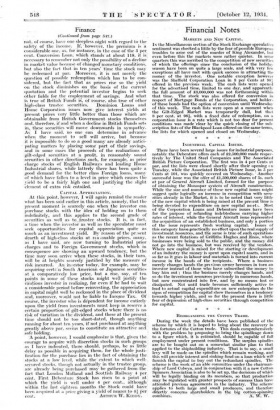Finance
The Hunt for Investments—I
AT the end of last Week there was a fractional decline in British Funds and other high-class. investments. The set-back is due, I think, first to the knowledge of a great number of impending issues of Corporation stocks, but also, perhaps, to a feeling that present prices are very high. This set-back was soon regained, however, and the market was hardly affected at all by the outrage at Marseilles, for at present there are no definite signs of change in the monetary situation, and, as I have often explained, it is the cheapness of money which has been chiefly responsible for driving up the prices of British Funds and kindred stocks.
Meanwhile, the number of communications from those who are hard bit by this rise in investment stocks increases almost daily. The situation, indeed, is in many respects almost unparalleled, for while we have had Consols at a higher price than at present and have had similar stocks giving an even lower rate of interest than that which can now be obtained, the causes operating have been of a more temporary nature, while pot only have they been unaccompanied by any such high taxation as that which exists today, but also some forty years ago, when Consols and similar stocks were at an abnormally high level, there was no special fear on the part of those dependent upon small income from their investments of a possible rise in the cost of living such as that which exists today.
PROBLEM OF REINVESTING.
Pushed, therefore, on the one hand, by the purely nominal rate of interest on banking deposits, and beset, on the other hand, by doubts whether pre- sent high prices of gilt-edged securities are justified, the investor is often at his wits' end as to the course which should be pursued. Especially is this the case with those to whom the declining rate of interest means all the difference between comparative comfort and an actual difficulty in Making both ends meet. I am, indeed, frequently receiving letters in which the writers ask whether it would be well to sell this and that Govern- ment stock and reinvest in certain other specified securi- ties. I usually find, however, that 11N-other specified securities are of a kind which entail ethsiderable risk and, therefore, it is impossible to counsel an exchange. It is, in fact, the problem of reinvestment which is the real difficulty because there must be few high-class investment stocks where a sale tomorrow would not mean, for the moment at all -events, an actual increase in capital. -
LIMIT TO THE RISE.
: Now, although present appearances may be to the Contrary, we know that there is an ultimate limit to the rise in securities, however gilt-edged they may be, and, further, that when that point is reached the movement in the opposite direction may quite well' continue for a Considerable period. I recognize, therefore, that it would be highly convenient for the readers of this article if I could give even an approximate date of this peak being reached. It would be an easy matter then, of course, for the holder of the stocks concerned to realize, say, some few weeks or months before the peak was expected to be reached. Unfortunately, however, no one is able to give this coveted information. I can only, therefore, offer a few general hints which may, or may not, be useful to the perplexed investor.
SAFETY OF CAPITAL.
I suggest, therefore, in the first place, that, except for those fortunate people who find that even the present 'yield on Government stocks is ample to meet their income requirements, and to whom a possible loss in capital value through a downward tendency later on is a small con- sideration if the income is maintained, the present moment is not one when securities,-howeversinind, can be bought to hold on to indefinitely. Lest I should be misunder- stood, -however, let me explain that Larir thinking of the safety of eapitd/ rather than of income. If, for example, the investor decides to cast anchor in some long-dated Government stock standing at a premium, he or she need (Continued on page 518.)
Finance - (Continued from page 547.)
not, of course, have one sleepless night with regard to the safety of the income. If, - however, the premium is considerable one, as, for instance, in the case of the 5 per cent. Conversion Loan, which stands' at about 118, it is necessary to remember not only the possibility of a decline in Market value because of changed monetary condition's, but also the fact that in ten years' time the stock may be redeemed at par. Moreover, it is not merely the question of possible redemption which has to be con-' sidered, but the fact that as prices- rise so the yield on the stock diminishes on the basis of the current quotation and the potential investor begins to seek other fields for .the employment of savings. And . what is trite of British' Funds is, Of -course; alsO -true of other high-class trustee securities. Dominion -Loans and Home Corporation issues now, give interest yields at present prices very little better than those which are obtainable from British Government stocks themselves and, therefore, if and when a decline in British Funds sets in, these securities will move- downwards in sympathy. As- I have said, no one can determine in advance when the moment to sell will arrive, but because it is impossible to do so a good many are already antici- pating matters by placing softie part of their savings, and in some cases the proceeds of the realizations of gilt-edged securities at a profit, in reasonably sound securities in other, directions such, for example, as prior charge stocks of English Railways and leading Home Industrial shares, while latterly there has been quite a good demand for the better class Foreign loans, many of which have fallen to a level in price which causes the yield to be a fairly high one and justifying the slight element of extra risk entailed.
CAPITAL APPRECIATION.
•
At this point, however, I will again remind the reader -what has been said earlier in this article, namely, that the present moment is scarcely one when the investor can purchase stocks with the' idea- of holding on to them indefinitely, and this applies to the second grade of securities as well as to4rustee stocks. It is, in fact, a time when the investor as well as the speculator must seek opportunities' for capital appreciation quite as much as an investment yield. By reason of the pr2.sent dearth of high-class stocks at rra3onable prices, many, as I have said, are now turning to Industrial prior charges and to Foreign Government steaks, which in consequence are showing an upward tendency, but the time may soon arrive when these stocks, in their turn, ; will be at heights scarcely justified by the measure of risk. incurred: An in veStor tOday;' for example, may be . acquiring certr.:n South American or Japanese securities - at a comparatively low price;, but .a rise,- say, of ten points in some of these stocks might well justify the cautious investor in realizing, for even if he had to wait a considerable period before reinvesting, the appreciation in capital might well be reckoned in the place of dividend and; moreover, wanld not be liable to Income Tax. Of course, the investor who is deljendexit for income entirely upon the yield from investments must keep in reserve a certain proportion of fact that London Midland and Scottish Railway 4 per &int. First Debenture Stock has risen to a point at which the yield is well under 4 -per cent., although gilt-edged stocks where ere s no risk of variation in the dividend, and these at the present . REORGANIZING THE COTTON TRADE. time should not be too short-dated, though anything' running for about ten years, if not purchased at anything scheme D During n by the week' the odetuils have been published of the greatly above par, seems to constitute an attractive and _ h. it is hoped _to bring__ about the recovery, in safe holding. with the problem by proposing to bring the spindleage down 'A point, however, I would emphasize is that, given the ; to a figure which, it is estimated, shoidd be capable of full courage to acquire with discretion stocks in such groups employment under present Conditions. The surplus spindles as I have indicated, there should, perhaps, be as little are to be bought out on a somewhat similar plan to that delay as possible in acquiring them, u to the shipbuilding for the whole j fieation for the purchase lies in the fact of obtaining the is th will provide interest and sinking fund on a loan which will stocks at a low level, while the' extent to which well-, furnish the capital to buy out the -redundant spindles. The seCured stocks, though not actually in the trustee group, scheme is the work of an able committee under the chairman- are already being 'purchased May be gathered from the ship of Lord Colwyn, and in conjunction with it a new Cotton Spinners Association is also to be set up, the decisions of which will be legally binding on its members, so that production inay be regulated with greater prospects of success than have















































 Previous page
Previous page